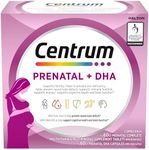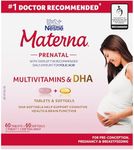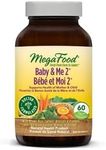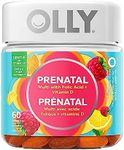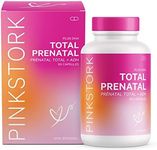Buying Guide for the Best Prenatal Vitamins
Choosing the right prenatal vitamins is an important step for anyone who is pregnant or planning to become pregnant. Prenatal vitamins are designed to support the health of both the mother and the developing baby by providing essential nutrients that might be difficult to get in sufficient amounts from diet alone. When selecting a prenatal vitamin, it's important to understand what nutrients are most important during pregnancy and how to match the supplement to your individual health needs and lifestyle.Folic Acid (Folate)Folic acid, or its natural form folate, is a B vitamin that helps prevent neural tube defects in the developing baby. This is one of the most critical nutrients in prenatal vitamins. Most recommendations suggest at least 400 to 800 micrograms daily. Some people may need more if they have certain health conditions or a history of neural tube defects. If you are planning to become pregnant, it's best to start taking folic acid before conception and continue through early pregnancy, as the baby's neural tube develops in the first few weeks.
IronIron is essential for making extra blood to supply oxygen to the baby and to prevent anemia in the mother. Prenatal vitamins typically contain more iron than regular multivitamins. The amount can range from about 18 mg to 30 mg or more. If you are prone to low iron or have been diagnosed with anemia, you may need a higher amount, but too much iron can cause stomach upset or constipation. Choose a prenatal vitamin with an iron level that matches your doctor's advice and your body's needs.
CalciumCalcium helps build the baby's bones and teeth, and also supports the mother's bone health. Prenatal vitamins often contain some calcium, but not always the full daily requirement, as calcium is bulky and hard to fit into a single pill. Typical amounts range from 150 mg to 300 mg per serving. If you don't get enough calcium from your diet, you may need to supplement separately. Consider your dietary intake and talk to your healthcare provider about your total calcium needs.
Vitamin DVitamin D works with calcium to help the baby's bones and teeth develop. It also supports the immune system. Prenatal vitamins usually provide between 400 IU and 1000 IU of vitamin D. If you have limited sun exposure or have been told you are low in vitamin D, you may need a higher dose. Check the label and consider your lifestyle and any advice from your healthcare provider.
IodineIodine is important for the baby's brain and thyroid development. Not all prenatal vitamins contain iodine, but it's recommended to get about 150 micrograms daily during pregnancy. If you don't use iodized salt or eat foods rich in iodine, make sure your prenatal vitamin includes it. Check the ingredient list to ensure you are getting enough.
Omega-3 Fatty Acids (DHA/EPA)Omega-3 fatty acids, especially DHA, are important for the baby's brain and eye development. Some prenatal vitamins include DHA, while others require a separate supplement. Typical amounts range from 200 mg to 300 mg. If you don't eat fish or fortified foods, look for a prenatal vitamin that includes DHA or consider a separate omega-3 supplement.
Form (Pill, Gummy, Liquid)Prenatal vitamins come in different forms, such as pills, gummies, or liquids. Pills often contain more nutrients, but some people find them hard to swallow or digest. Gummies are easier to take but may lack iron or other key nutrients. Liquids can be a good option if you have trouble with pills, but check the nutrient content. Choose a form that you can take consistently and that provides the nutrients you need.
Other Nutrients (B12, Zinc, Vitamin C, etc.)Prenatal vitamins may also include other nutrients like vitamin B12, zinc, vitamin C, and more, which support overall health and the baby's development. The amounts can vary widely. If you have specific dietary restrictions (like being vegetarian or vegan), pay attention to these nutrients to ensure you are not missing anything important. Consider your overall diet and any advice from your healthcare provider when evaluating these additional nutrients.


